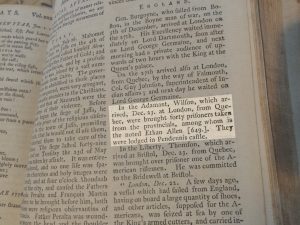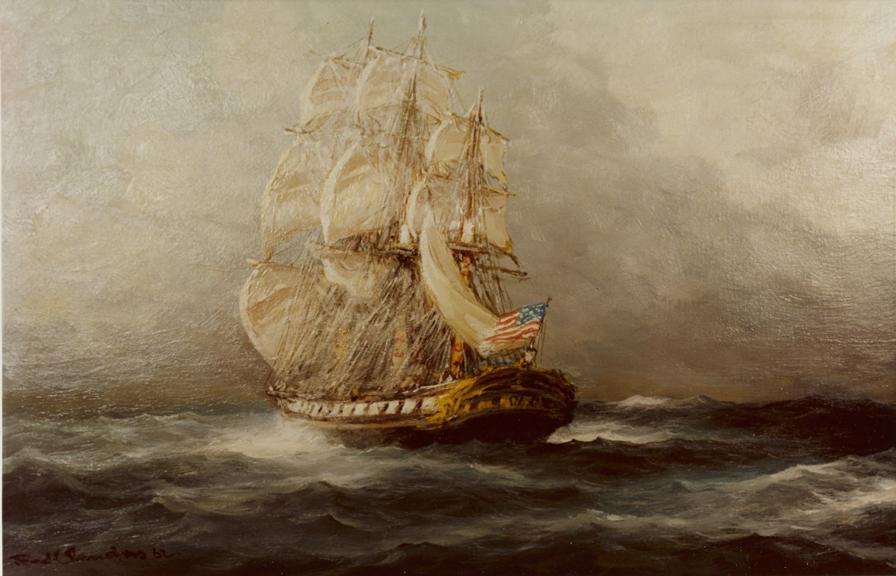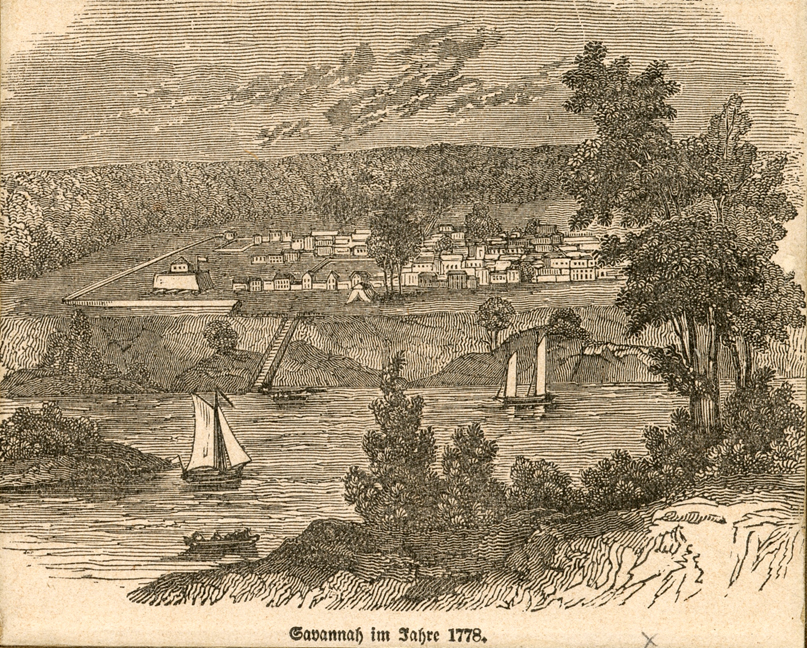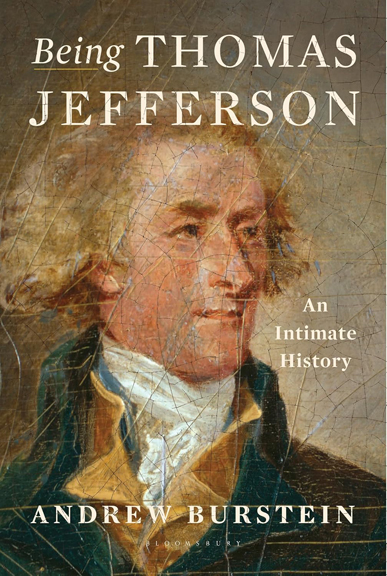The American public’s interest in Ethan Allen as a “larger than life” folk hero during and since the American Revolution is well documented.[1] After leading the capture of Ft. Ticonderoga in May 1775, Allen’s notoriety as the leader of the Green Mountain Boys in the northern frontier, which subsequently became Vermont, spread throughout the thirteen colonies. The thought to be impregnable Ft. Ticonderoga was regarded as the “Gibraltar of North America” and Allen’s seizure instilled the widespread impression of a vaunted military commander. However, it would be Allen’s only military victory.
Even in defeat Allen was portrayed as a hero. On September 25, 1775 British forces captured Allen while commanding a rash attempt to take Montreal far in advance of the main Patriot army. A widely popular American propagandist play entitled “The Fall of British Tyranny” chronicled a purported heroic last stand by Allen.[2] Adding to his courageous reputation Allen penned a narrative on his subsequent captivity, describing harsh internment conditions while persevering through immense physical discomfort.[3] His incarceration chronicle became the 2nd most printed book in the United States during the Revolution (Thomas Paine’s Common Sense was the most printed).[4] Further, Allen’s strident advocacy of Vermont’s independence from New York and New Hampshire including authoring numerous pamphlets and newspaper articles generated additional publicity.
But what is lesser known is that the British populace was also fascinated with Ethan Allen. He was the first high profile prisoner garnered by British forces after the outbreak of hostilities and Allen was among the first and only prisoners shipped to England.[5] His presence immediately became a domestic British political issue and a rallying symbol for the opponents of King George’s policies towards America. Given this fame, when it looked like Allen might lead Vermont back into allegiance with the Crown, he provided hope for a British turnaround and victory. Much of what the British people knew about Ethan Allen came from copious and widely disseminated newspaper articles.
British Newspaper and Periodical Reporting on Ethan Allen
The capture of Ft. Ticonderoga in the beginning stages of the Revolution is the dramatic episode, which elevated Ethan Allen from a small time, backwoods agitator into a mythic internationally recognized character. However, initial British press reports highlight Colonel James Easton’s role in the assault.
June 1775, Scots Magazine,
The commanding officer came forth; Col. Easton clapped him upon the shoulder, told him he was prisoner; and demanded, in the name of America, an instant surrender of the fort, with all its contents, to the American forces.
James Easton, a Colonel in the Berkshire militia, brought news to the Massachusetts Provincial Congress, which was the initial source reported in British press. Interesting there was no mention of Benedict Arnold who claimed co-command of the fort’s capture.[7]
Subsequent British press reports significantly elevate Ethan Allen’s role in Ticonderoga’s capture and his fighting reputation began to dramatically rise. Within two months, the British press placed Allen in the front ranks of American military leaders albeit laced with sarcasm aimed at the entire group.
August 3, 1775, London Gazette,
The Americans seem to out-number us in Generals, there appearing, from several of their accounts to be the following, viz. Gen. Putnam, Gen. Pomroy, Gen. Washington, Gen. Lee, Gen. Ward, and Gen. Doctor Warren, killed in the late engagement, besides other superior commanders, as Col. Ethan Allen at Ticonderoga, and Col. Henry, at Virginia, &c.
Following up on the success at Ticonderoga, Ethan Allen, without a formal military rank and commission led a group of Vermont and Canadian volunteers during the fall 1775 invasion of Canada. His volunteers advanced well in front of the main Patriot Army in a reckless and foolhardy attempt to take Montreal. Allen and most of his men were captured in a brief, but bloody engagement with British forces a few miles from the city. Given Ethan Allen’s stature as a leading Patriot leader and for being the “conqueror of the mighty Ticonderoga” his capture was widely reported. Further, after major British losses at Lexington, Concord and Bunker Hill, this was the first clear-cut victory, which provided the British press with positive news to report.
November 8, 1775, Kentish Gazette,
….the rebels were defeated and fled, with the loss of about 15 or 16 killed, and between 30 and 40 made prisoners; among the later was one Ethan Allen styling himself Colonel, and who commanded the party.
Derided as a “make believe” military officer fostering civil unrest, Allen’s motives were seen as self-serving and economically driven. He was not portrayed as attempting to win political freedom, but capitalizing on domestic instability to loot goods and materials.
November 13, 1775, Northampton Mercury,
…taken Prisoners, with their Commander Allen, the Cause of all the Disturbances of this Province, and how it seems, had promised his Party the Plunder of Montreal.

Canadian Governor Guy Carleton believing that he was simply dealing with leaders of a civil insurrection, transported Ethan Allen and the other captured prisoners to England for trial and presumed hanging. Allen was remanded to Sir Brook Watson, a British merchant for transport to Falmouth on the ship, Adamant. Allen described Watson as a “man of malicious and cruel disposition.”[8]
The arrival of the conqueror of the previously thought invincible Ft. Ticonderoga was widely reported in the British press.
December 1775, Scots Magazine,
In the Adamant, Wilson, which arrived, December 23, at London, from Quebec, were brought 40 prisoners taken from the provincials, among whom is the noted Ethan Allen. They were lodged in Pendennis Castle.
The British government and public soon recognized that Governor Carleton’s initial move to punish Allen and his men as common criminals fomenting civil unrest was not a sustainable policy. As the Americans captured British soldiers, it became readily apparent that hanging Allen or other prisoners would result in American retaliatory executions.
December 27, 1775, Kentish Gazette,
Many arguments have arose about what government mean to do with the above prisoners; the great number of men in the hands of the provincials, will surely prevent our proceeding with severity towards them.
From the time of his capture, Allen was reportedly kept in chains under harsh conditions. British press reports expressed concern that British officers and men would receive the same treatment. In addition, they further questioned the wisdom of the British government’s American policies.
January 6, 1776, Kentish Gazette,
We hear that Ethan Allen, a provincial Colonel, was brought from America to England hand-cuffed, and that the forty prisoners, who were brought over with him, were never suffered to come upon the deck for air during the voyage. Is not this cruelty exceedingly impolitic? There is not a doubt that the Congress will return the compliment on Noblemen’s nephews, Colonels, Captains, and other subaltern officers, taken at Fort St. John, as soon as they are acquainted with the severity practiced on their countrymen. “The destined cord” will not now be a dangerous experiment. But this is not the first blunder in this business, made on this side of the water.
Ethan Allen’s imprisonment and treatment became a domestic political issue bandied in the press. British politicians opposed to the government American policies hired Lord Ashburton, John Dunning and John Alleyne as counsel to obtain writ of habeas corpus.[9] The opposition politicians sought to establish under what authority were the American prisoners held and to provide access to the British civilian justice system.
January 26 1776, Hibernian Journal Or Chronicle of Liberty,
The SUPPORTERS of the BILL OF RIGHTS, the LONDON ASSOCIATION, and all TRUE PATRIOTS, are called upon to DEMAND an Extension of the Habeas Corpus to these Americans, and no longer permit the inexorable Tyranny of Ministers, to bid Defiance to Mercy and Justice.
Within a few weeks, Ethan Allen and his fellow prisoners are ordered to embark on the Solebay for return to America. The opposition continued to question the government’s policies and sought answers to why they were sent back across the Atlantic.
January 11, 1776, Bath Chronicle and Weekly Gazette,
Col. Ethan Allen and the other prisoners in Pendennis castle, are ordered back to America in the first vessel to Boston. Government have expressed their dislike of the conduct of General Carleton in sending them over. When Mr. Watson was told of Allen and the others sent back prisoners to Boston, he replied, It was punishment sufficient enough.
Throughout the year 1777, British newspapers reported specific American retaliation against senior British soldiers for Allen’s reputed harsh treatment.
January 20, 1777, Northampton Mercury, Northampton,
This severe treatment (of General Prescott) the Congress declared was intended as a Retaliation for the imprisonment of Ethan Allen.
Further, during 1777 there were attempts made by American Generals Lee and Gates and the American Commissioners in Paris, to arrange for Ethan Allen’s exchange and release. When a prisoner swap was finally consummated in May 1778, the reporting was rather matter of fact without recognizing a military rank for Allen.
June 13, 1778, Newcastle Courant,
Major General Lee is exchanged for Major General Prescott, and Lt. Col. Campbell of the 71st for Ethan Allen.
Ethan Allen did not appear in the British press during the years 1779 and 1780. However, in 1781, Ethan Allen prominently returned to the British news with the reported prospect of leading Vermont to rejoin the British Empire.
January 1781, Scots Magazine,
New York December 20. Nothing (according to accounts received from America towards the end of January) has more disconcerted or given to much vexation to the Congress, as the establishment, against their will or approbation, of a new State call Vermont, which is situation on the frontier parts of New Hampshire, Connecticut and New York, of extensive territory, fertile soil, and tolerably well peopled. A set of the leading people in this quarter of America, joined by many of the New Hampshire men, among whom the famous Ethan Allen is the principal mover, have drawn the lines of the state, established laws and regulations, expressly contrary to the will or wishes of Congress.
Mistakenly, several inaccurate reports of Ethan Allen and the people of Vermont rejoining the British forces were published.
February 1, 1781, Stamford Mercury,
The last accounts from America say, that our affairs wear a very favorable aspect in the neighborhood of Albany and Ticonderoga, where Col. Ethan Allen (the Arnold in that part of the country) has joined the King’s troops, with a considerable body of men well armed and disciplined; and that the inhabitants, who have been hitherto some of the most violent in favour of rebellion, are coming over the very fast to the royal cause…
February 22, 1781, Bath Chronicle and Weekly Gazette,
There is every reason to suppose that EA has quitted the rebel cause.
In fact, Allen’s reputed return to allegiance to the Crown is given as a reason why the British had a clear chance at victory in early 1781.
March 12, 1781, Aberdeen Journal,
…that Ethan Allen has fortified himself near Ticonderoga, and defied the Rebels. Our troops at New York were in the highest spirits and amply supplied with beef, mutton, fish, fowl and liquors, while their enemies continued to be in the most wretched situation, without clothes, pay or provisions. In short, there now appears a real prospect of America being reduced to obedience in two or three months at largest.
Even after the American victory at Yorktown the British press continued to print stories on the negotiations between leaders of Vermont including Ethan Allen and the British governor in Canada, Frederick Haldimand.
October 25, 1783, Ipswich Journal,
Ethan Allen whose state is refused to be added to the thirteen, on his part as absolutely refuses his submission and asserts the independence of his district; the manner in which the population of Vermont increases, and the number of loyalists resorting thither, may prove matters of serious consideration on the continent of North America.
After the Treaty of Paris ending the Revolution, the British press continued to write about Allen. British papers covered Allen’s participation in Wyoming Valley jurisdictional dispute between Pennsylvania and Connecticut.[10] Later sarcastic reports of Allen’s philosophical treatise “ Reason the only Oracle of Man” were published.
February 3,1787, Northampton Mercury,
Ethan Allan, who was in the Provincial service during the War, we hear, has dipped his Red Coat in Black of the deepest Tartarean Die, being now not only a Preacher, but the Author of a large Octavo Volume containing a new System of Deism of the most pernicious Tendency.
However in death, the British newspapers paid more respect to Allen including in his death notice an honorific and his military title, something that the first reports in 1775 omitted.
May 12 1789, Leeds Intelligencer,
On the 13th of February died in VT, North America, Ethan Allen, Esq. Brigadier General of the militia of that Sate, and well known during the disputes between this country and the US.
Conclusion
British newspapers prominently featured Ethan Allen with over 200 citations from 1775 to his death in 1789. His news coverage overshadowed the more famous in America Benedict Arnold, his co-commander at Ticonderoga and high profile turncoat who was named in less than 100 British newspaper articles during the same period.[11]
Ethan Allen touched a nerve, which greatly interested the British populous. He was one of the few Patriot captives brought to England and the most high profile. Further his willingness to stand up to governmental authority on both sides of the Atlantic contributed to his celebrity status. Many British readers, especially those in opposition to the war viewed him as fighting for the common man and against governmental overreach.
[1] For a description of how biographers and historians created the reputation and legend of Ethan Allen see, John J. Duffy, and H. Nicholas Muller III, Inventing Ethan Allen (Hanover & London: University Press of New England, 2014).
[2] For a complete assessment of the relationship between Ethan Allen’s own captivity narrative and The Fall of Tyranny play see, Ennis Duling, “Ethan Allen and the Fall of British Tyranny: A question of What Came First”, Vermont History, Vol. 75, No. 2, (Summer/Fall 2007), 134-140.
[3] An advertisement in the July 28, 1779 edition of The Pennsylvania Gazette billed his captivity as “…the most remarkable Occurrences”.
[4] Willard Sterne Randall, Ethan Allen: His Life and Times (New York & London: W. W. Norton & Company, 2011), xiii.
[5] Captured sailors around the British Isles were regularly imprisoned in England, but soldiers captured subsequent to the Ethan Allen group were incarcerated in British held North American territories.
[6] Utilized digitized search capabilities of The British Newspaper Archive, http://www.britishnewspaperarchive.co.uk for quotes.
[7] The Scots Magazine, June 1, 1775.
[8] Allen’s description of his treatment by Sir Brook Watson see, Stephen Care Arch, ed., A Narrative of Colonel Ethan Allen’s Captivity (Acton, MA: The Copley Publishing Group, 2000), 21.
[9] Lord Ashburton, John Dunning represented Benjamin Franklin before the Privy Council in 1774 and was a leading opposition member of Parliament.
[10] Hampshire Chronicle, October 2, 1786.
[11] Utilized digitized search capabilities of The British Newspaper Archive, http://www.britishnewspaperarchive.co.uk for statistics on number of articles on Allen and Arnold.









6 Comments
Thanks, Gene, for digging in to this background material that informs us about the realities of information that was currently available to folks in the 18th century. Always interesting to have a glimpse of what life was like before Twitter.
Yes, it might must have really vexed Revolutionary War publishers not be able to measure “retweets” and “favorites” of the multiple newspapers readers in colonial coffee houses and taverns!
Gene,
This is a nice review of Allen’s treatment by the British and is also relevant when considered in the context of the Americans’ treatment of British prisoners. In short, the infliction of heavy-handed incarceration by either side could have ramifications for the other when it came time to consider how to accommodate their captured soldiers. This will be the subject of an upcoming article of mine here in JAR that is now in the editor’s hands.
Your article shows how important it is to get the British perspective on things and to consider how the press contributed to them. It is always important to take every issue we see from an American viewpoint and then try to envision how our opponents and allies interpreted them – indeed, a lesson that remains important today. Thank you for this valuable contribution.
Gary, I agree that many Revolutionary War accounts represent an “overly American bias”. It was a multinational war fought in Caribbean, European and Asian theaters with many global political and economic influences and implications. By just focusing on the events in the 13 colonies, many important influences and outcomes are not properly interpreted. Further your suggestion that we need to recognize the voices of all participants resonates with me, both historically and today.
I am looking forward to your upcoming article on prisoners of war.
For more on Ethan Allen, I recommend ‘A Narrative of the Captivity of Col. Ethan Allen. . . .’ (Albany, 1814).
After being shipped back from England to Halifax where Ethan Allen was placed on a prison ship from whence in the summer of 1776 he was able to smuggle a letter to Captain Mariot Arbuthnot R.N. (1711-1794), then serving under an Admiralty commission as “Commissioner of Naval Affairs in North America” and “Commander in Chief of His Majesty’s Ships and Vessels which shall from time to time be at Halifax.” Arbuthnot also served as the Lieutenant Governor of Nova Scotia. Allen’s narrative then reveals Arbuthnot’s reposnse: “. . . for the governor sent an officer and surgeon on board the prison sloop, to know the truth of the complaint. The officer’s name was Russell who held the rank of lieutenant, and treated me in a friendly and polite manner, and was really angry at the cruel and unmanly usage the prisoners met with; and with the surgeon made a true report of matters to Governor Arbuthnot, who, either by his orders or influence, took us the next day to the Halifax jail, where I became acquainted with the now Hon. Lovel [James Lovell], one of the members of Congress for the state of Massachusetts.”
This ‘Lieutenant Russell’ mentioned above doubtless was Lieutenant Thomas Macnamara Russell R.N. (6 or 17 Jan 1739/40 – 22 July 1824) who was Lieutenant, HMS Albany, Sloop, then fitting out in Halifax Harbor. ‘Macnamara’ Russell had become a patron of Arbuthnot after serving as a ‘Master’s Mate’ aboard HMS Terrible (3d rate, 74 guns) when she was commanded by Arbuthnot.
Russell had a notable and colorful naval career during the America and Napoleonic wars including on 22 Jan 1783 when commanding HMS Hussar, a frigate of 20 guns, he fell in with the French 32-gun frigate Sibylle, which had been roughly handled by HMS Magicienne three weeks before, and afterwards, in a violent gale, had been dismasted, and obliged to throw twelve of her guns overboard. When Sibylle sighted the Hussar she hoisted the English flag over the French, the recognized signal of a prize, and at the same time, in the shrouds, another English flag, union downwards, the signal of distress. Russell accordingly bore down to her assistance, but as he drew near, his suspicions being roused, he did not close her. On this the Sibylle, under English colours, attempted to board the Hussar, but was beaten off with great loss, and when the Centurion, attracted by the firing, came within gunshot, the Sibylle surrendered. Indignant at the treacherous conduct of her captain, the Comte de Kergariou, Russell broke his sword and made him a close prisoner, with a sentry over him. When he brought the prize into New York he reported the circumstance, but, as peace was then on the point of being concluded, the affair was hushed up. Kergariou threatened to demand personal satisfaction, and after the peace Captain Russell, travelling with Vice Admiral Arbuthnot, went to Paris to meet him, but returned on finding that his would-be enemy had gone to the Pyrenees.
Thomas Macnamara Russell reportedly refused a knighthood because of the cost of maintaining that lifestyle; however, when commanding the North Sea squadron in 1807 He would enjoy large amounts of prize money. He held the rank of Admiral of the Blue when he died suddenly in his carriage on 22 July 1824.
Lt. Thomas Russell sounds ever bit of a unique character as Ethan Allen! As you point out, Allen’s narrative on his captivity is an interesting read. It both captivated 18th century contemporaries as well as audiences today. In many ways it created Allen as an American folk hero.